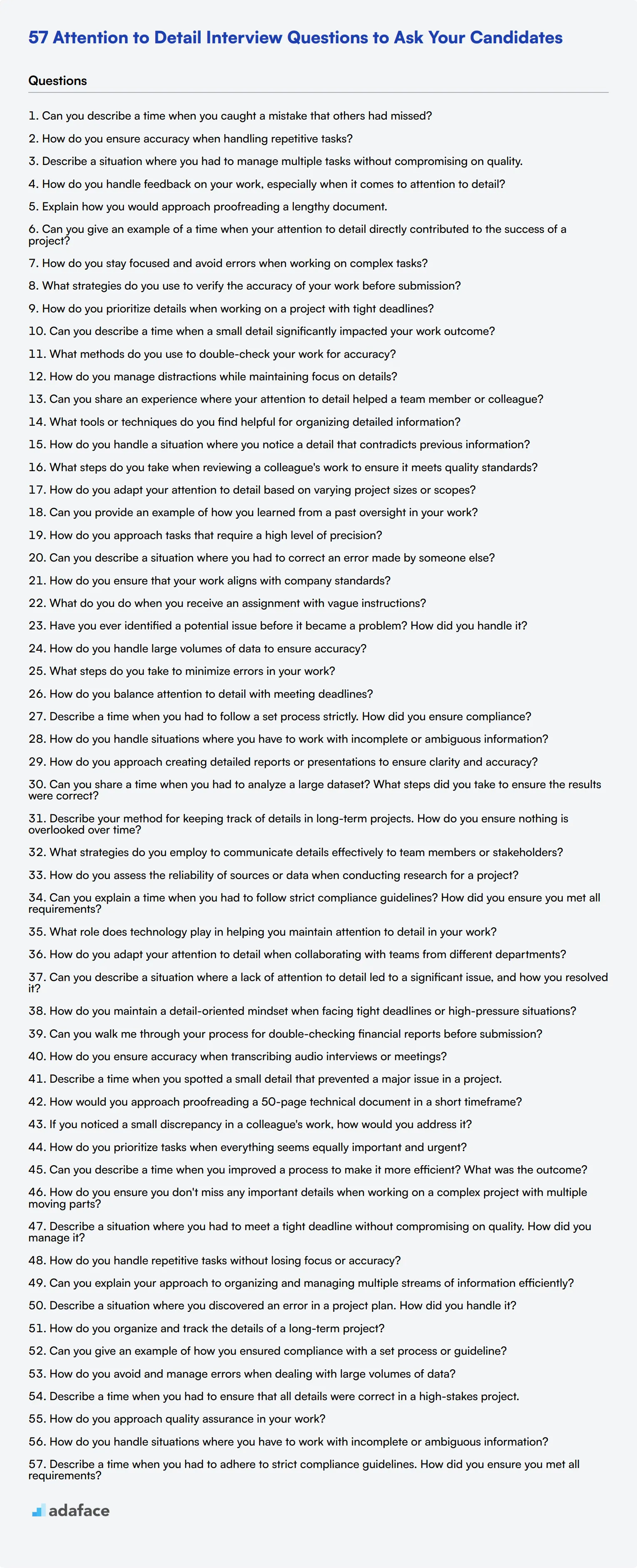In today's competitive job market, selecting the right candidate requires more than just a resume review. Assessing an applicant's attention to detail is crucial to ensure accuracy and high-quality work in your organization.
This blog post offers a comprehensive list of Attention to Detail interview questions tailored for different levels of candidates, from junior to senior positions. Each section includes specific questions and answers that help evaluate candidates' accuracy, thoroughness, and problem-solving skills.
By integrating these targeted questions into your interview process, you can identify candidates who possess exceptional attention to detail. For an added layer of assessment, consider using our Attention to Detail test before the interviews.
Table of contents
8 general Attention to Detail interview questions and answers to assess candidates
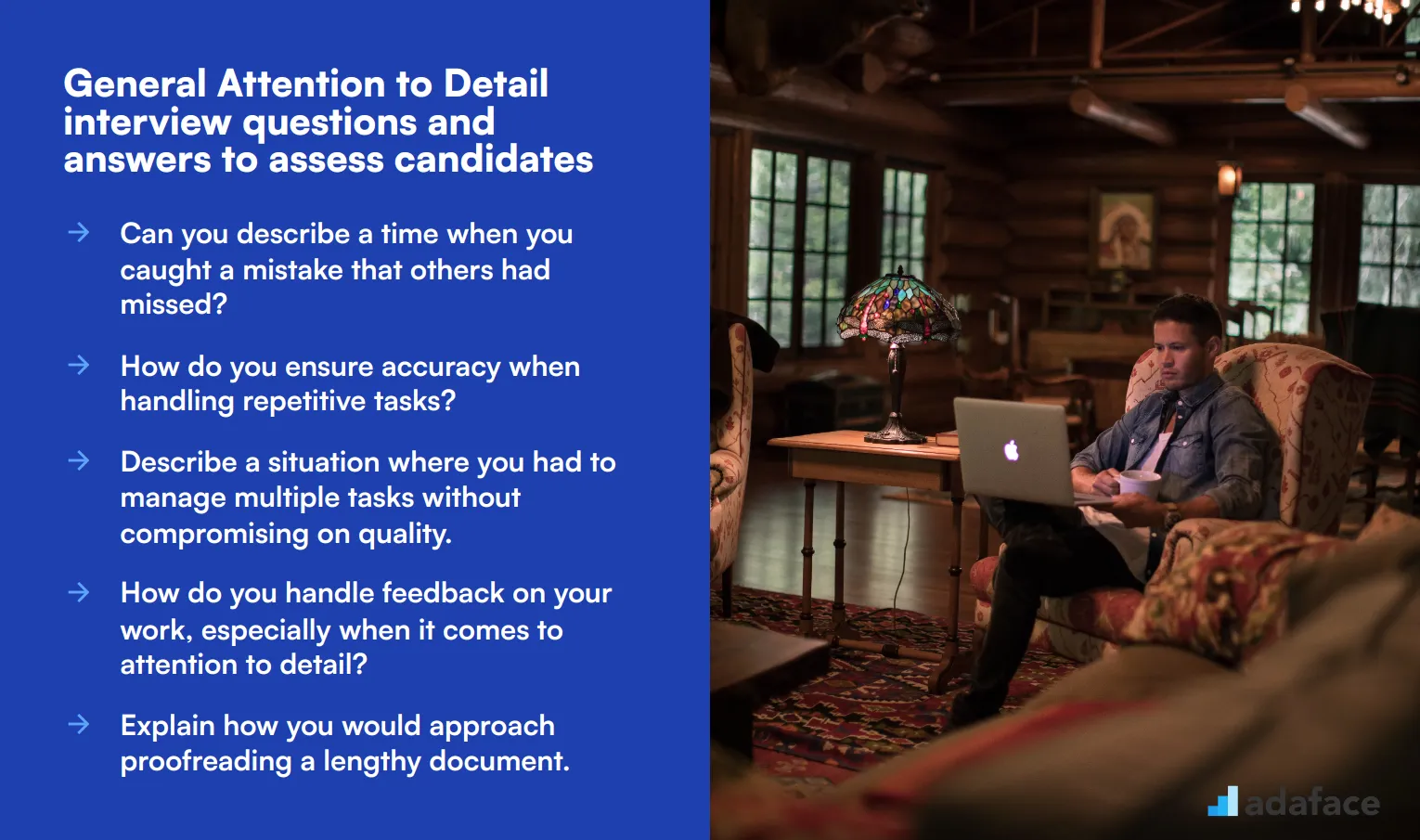
When it comes to hiring, attention to detail can be a game-changer. This list of interview questions will help you assess candidates' precision, thoroughness, and ability to spot even the smallest errors. Use these questions to find the meticulous professionals your team needs.
1. Can you describe a time when you caught a mistake that others had missed?
Strong candidates will often share a specific instance where their attention to detail saved a project from potential issues. They might mention a time when they caught a calculation error, a typo in a document, or a critical oversight in a proposal.
Look for candidates who can explain the situation clearly, describe the steps they took to identify the mistake, and outline the impact of their actions. This demonstrates their ability to remain vigilant and thorough in their work.
2. How do you ensure accuracy when handling repetitive tasks?
Candidates should discuss methods they use to maintain focus and accuracy during repetitive tasks. They might mention techniques like taking regular breaks, double-checking their work, or using tools and checklists.
An ideal response will include specific strategies the candidate has successfully used in the past. Look for answers that show a proactive approach to maintaining high standards, even during routine work.
3. Describe a situation where you had to manage multiple tasks without compromising on quality.
Candidates might describe a scenario where they were juggling various tasks with conflicting deadlines. Look for mentions of prioritization, time management, and how they ensured each task was completed accurately.
An effective answer will highlight the candidate's ability to stay organized and focused under pressure. They should demonstrate how they maintained attention to detail while handling a heavy workload.
4. How do you handle feedback on your work, especially when it comes to attention to detail?
A strong candidate will show that they are open to feedback and see it as an opportunity for improvement. They might discuss specific instances where they received constructive criticism and how they used it to enhance their attention to detail.
Look for responses that indicate a growth mindset and a commitment to continuous improvement. Candidates should emphasize their willingness to learn from mistakes and make necessary adjustments.
5. Explain how you would approach proofreading a lengthy document.
Candidates should outline a systematic approach to proofreading, such as breaking the document into sections, reading it multiple times, and using tools like spell checkers. They may also mention strategies like reading the document out loud or taking breaks to maintain focus.
Ideal responses will demonstrate a thorough and methodical approach. Look for candidates who emphasize the importance of catching both major and minor errors to ensure the document's accuracy and professionalism.
6. Can you give an example of a time when your attention to detail directly contributed to the success of a project?
Candidates should provide a concrete example where their meticulousness had a positive impact on a project. This could involve catching an error that would have led to significant issues, ensuring compliance with regulations, or enhancing the overall quality of the work.
Look for detailed explanations of the candidate's role, the actions they took, and the resulting benefits. This showcases their ability to contribute meaningfully to the team's success through their attention to detail.
7. How do you stay focused and avoid errors when working on complex tasks?
Candidates should discuss techniques they use to maintain concentration and accuracy on complex tasks. This might include breaking tasks into smaller, manageable parts, using checklists, or setting up a distraction-free workspace.
Effective answers will illustrate the candidate's proactive approach to managing complexity. Look for specific examples of how these techniques have helped them avoid errors and ensure high-quality outcomes.
8. What strategies do you use to verify the accuracy of your work before submission?
Candidates might mention strategies like double-checking their work, using peer reviews, or employing software tools to catch errors. They should provide examples of how these strategies have been effective in their past roles.
An ideal response will show that the candidate values accuracy and takes concrete steps to ensure their work meets high standards. Look for detailed descriptions of their verification process and the benefits it has brought to their work.
10 Attention to Detail interview questions to ask junior employees
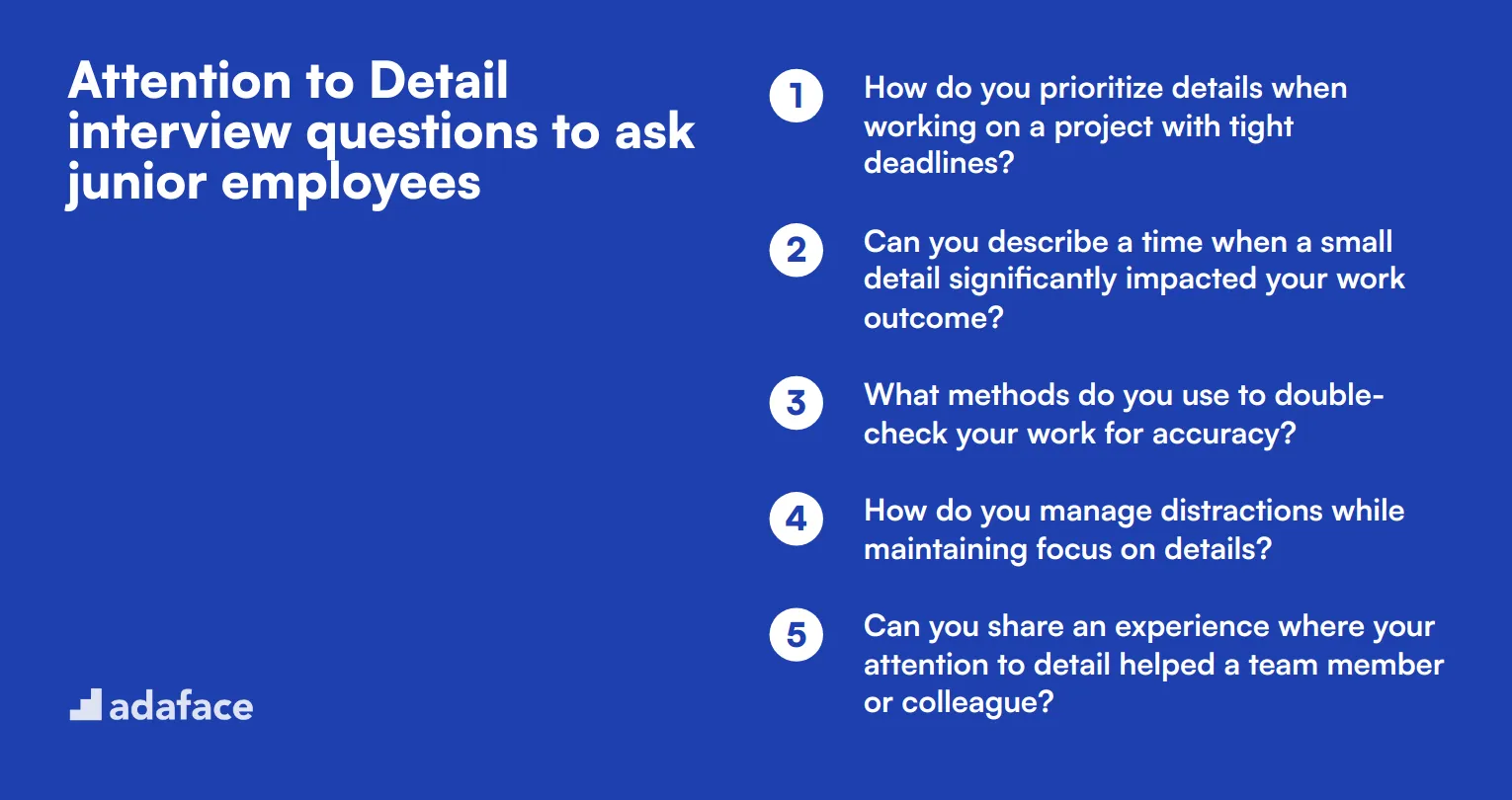
To ensure that junior employees can effectively contribute to your team, it's crucial to assess their attention to detail. Use these questions during interviews to uncover how candidates approach tasks, identify potential pitfalls, and maintain high standards. This will help you find candidates who can excel in roles such as analyst jobs.
- How do you prioritize details when working on a project with tight deadlines?
- Can you describe a time when a small detail significantly impacted your work outcome?
- What methods do you use to double-check your work for accuracy?
- How do you manage distractions while maintaining focus on details?
- Can you share an experience where your attention to detail helped a team member or colleague?
- What tools or techniques do you find helpful for organizing detailed information?
- How do you handle a situation where you notice a detail that contradicts previous information?
- What steps do you take when reviewing a colleague's work to ensure it meets quality standards?
- How do you adapt your attention to detail based on varying project sizes or scopes?
- Can you provide an example of how you learned from a past oversight in your work?
10 intermediate Attention to Detail interview questions and answers to ask mid-tier employees.
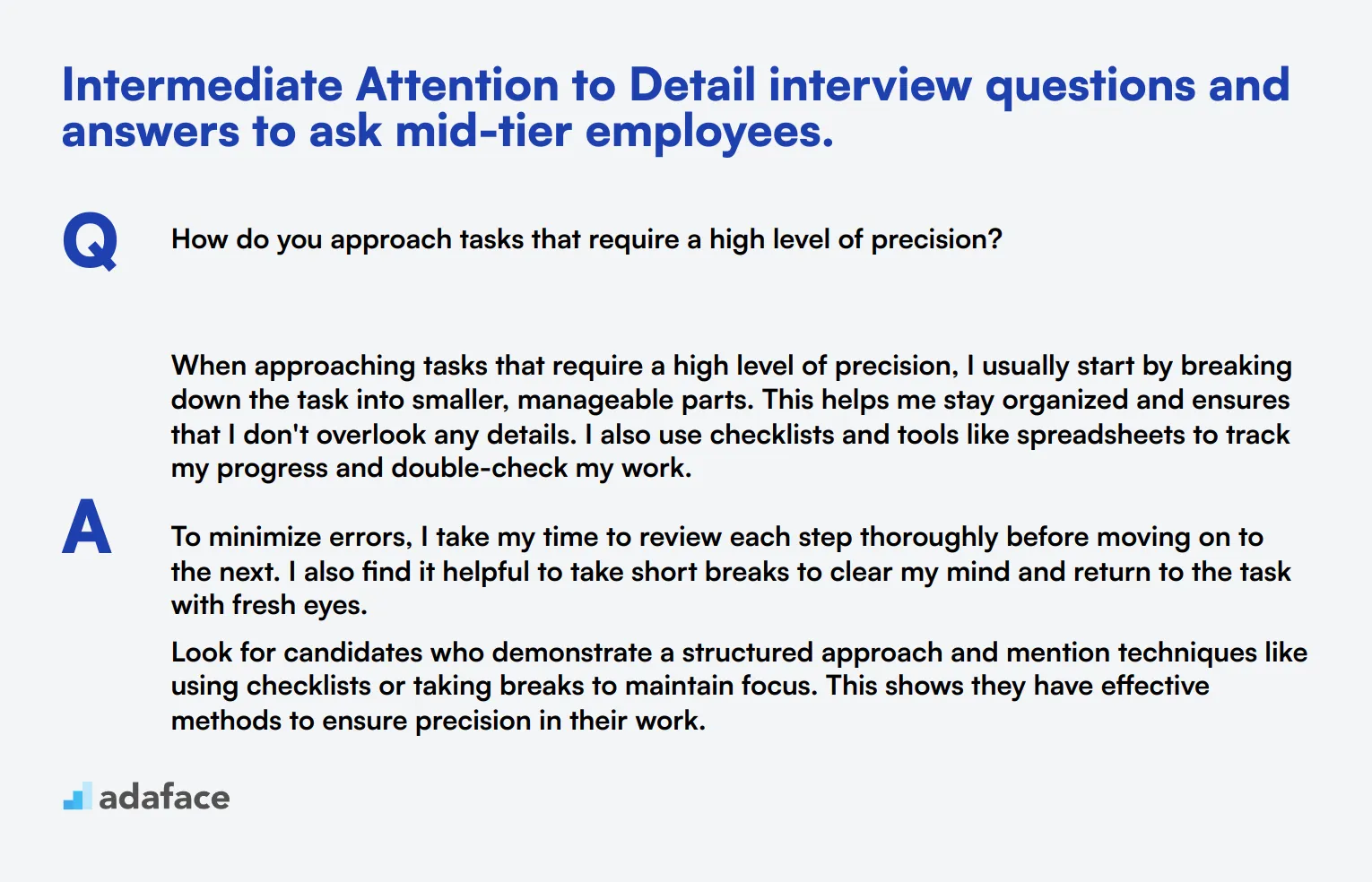
For mid-tier employees, mastering attention to detail is crucial. This list of intermediate questions will help you gauge their ability to maintain high standards and spot inconsistencies, ensuring they fit seamlessly into your team.
1. How do you approach tasks that require a high level of precision?
When approaching tasks that require a high level of precision, I usually start by breaking down the task into smaller, manageable parts. This helps me stay organized and ensures that I don't overlook any details. I also use checklists and tools like spreadsheets to track my progress and double-check my work.
To minimize errors, I take my time to review each step thoroughly before moving on to the next. I also find it helpful to take short breaks to clear my mind and return to the task with fresh eyes.
Look for candidates who demonstrate a structured approach and mention techniques like using checklists or taking breaks to maintain focus. This shows they have effective methods to ensure precision in their work.
2. Can you describe a situation where you had to correct an error made by someone else?
In my previous role, I noticed a discrepancy in a financial report submitted by a colleague. I approached them discreetly and pointed out the mistake. Together, we reviewed the data and fixed the error before it could impact any decisions.
I believe in addressing such issues calmly and collaboratively to maintain a positive working environment. It's important to focus on the solution rather than placing blame.
Ideal responses should show that the candidate can handle such situations diplomatically and can work with others to rectify errors without causing friction. This indicates strong interpersonal and problem-solving skills.
3. How do you ensure that your work aligns with company standards?
I start by familiarizing myself with the company's standards and guidelines. This includes reading any manuals or documentation provided and seeking clarification from supervisors if needed. I also make it a point to regularly review these standards to stay updated on any changes.
Before submitting my work, I cross-check it against the company standards to ensure compliance. I also seek feedback from colleagues or supervisors to identify any areas of improvement.
Applicants should demonstrate a proactive approach to understanding and adhering to company standards. Look for mentions of regular reviews and seeking feedback as indicators of their commitment to maintaining quality.
4. What do you do when you receive an assignment with vague instructions?
When I receive an assignment with vague instructions, my first step is to seek clarification from the person who assigned it. I ask specific questions to understand their expectations and the desired outcome. If that's not possible, I use my best judgment and past experiences to fill in the gaps.
I also document any assumptions I make and communicate them to ensure we're on the same page. This helps in avoiding misunderstandings and ensures that my work meets the required standards.
Strong candidates will show initiative in seeking clarity and not hesitate to ask questions. Their approach should demonstrate a balance between taking independent action and ensuring alignment with expectations.
5. Have you ever identified a potential issue before it became a problem? How did you handle it?
Yes, in my previous role, I once noticed a trend in customer feedback that indicated a potential issue with a new product feature. I gathered the relevant data and presented my findings to the product team, suggesting a few improvements.
The team appreciated the proactive approach, and we managed to address the issue before it escalated. This not only improved customer satisfaction but also saved the company from potential negative reviews.
Look for candidates who show foresight in identifying potential issues and taking proactive steps to address them. This indicates a strong sense of responsibility and commitment to quality.
6. How do you handle large volumes of data to ensure accuracy?
When handling large volumes of data, I rely on a combination of automated tools and manual checks. I use software for initial data processing and validation, but I also perform spot checks to ensure the accuracy of the results.
I also organize the data in a structured manner, using labeling and categorization to make it easier to identify any anomalies. Regular backups and version control are also crucial to prevent data loss and maintain integrity.
Candidates should mention the use of both automated and manual methods to ensure data accuracy. Their approach to organization and backups indicates their thoroughness and attention to detail.
7. What steps do you take to minimize errors in your work?
To minimize errors, I follow a systematic approach. I start by understanding the requirements thoroughly and planning my work accordingly. I also use tools like checklists and templates to ensure consistency.
Before submitting any work, I take the time to review it multiple times. Peer reviews and feedback sessions are also part of my process to catch any errors I might have missed.
Ideal responses should highlight a structured approach and the use of tools for consistency. Mentioning peer reviews indicates that the candidate values collaborative quality assurance.
8. How do you balance attention to detail with meeting deadlines?
Balancing attention to detail with meeting deadlines requires effective time management. I start by breaking down the task into smaller parts and setting mini-deadlines for each. This helps me stay on track without compromising on quality.
I also prioritize tasks based on their complexity and importance, focusing on high-impact areas first. Regularly reviewing my progress allows me to make adjustments and ensure that I meet both quality standards and deadlines.
Candidates should demonstrate an ability to manage their time effectively and prioritize tasks. Look for mentions of planning, setting mini-deadlines, and regular progress reviews as indicators of their capability.
9. Describe a time when you had to follow a set process strictly. How did you ensure compliance?
In a previous role, I was responsible for quality control in a manufacturing process that required strict adherence to protocols. To ensure compliance, I followed the documented procedures meticulously and used checklists to track each step.
I also conducted regular audits and cross-checked my work against the process guidelines. Communication with my team was crucial to ensure that everyone was on the same page and followed the same standards.
Look for candidates who can demonstrate their ability to follow strict processes without deviation. Their approach should include the use of checklists, audits, and effective communication to ensure compliance.
10. How do you handle situations where you have to work with incomplete or ambiguous information?
When faced with incomplete or ambiguous information, I start by gathering as much context as possible. I reach out to colleagues or supervisors for additional details and clarify any uncertainties.
If I'm unable to get more information, I rely on my best judgment and past experiences to fill in the gaps. I document any assumptions I make and communicate them to ensure alignment with expectations.
Ideal candidates should show initiative in seeking clarification and demonstrate the ability to make informed decisions even with limited information. Their approach should include documenting assumptions and communicating them clearly.
10 advanced Attention to Detail interview questions to ask senior employees
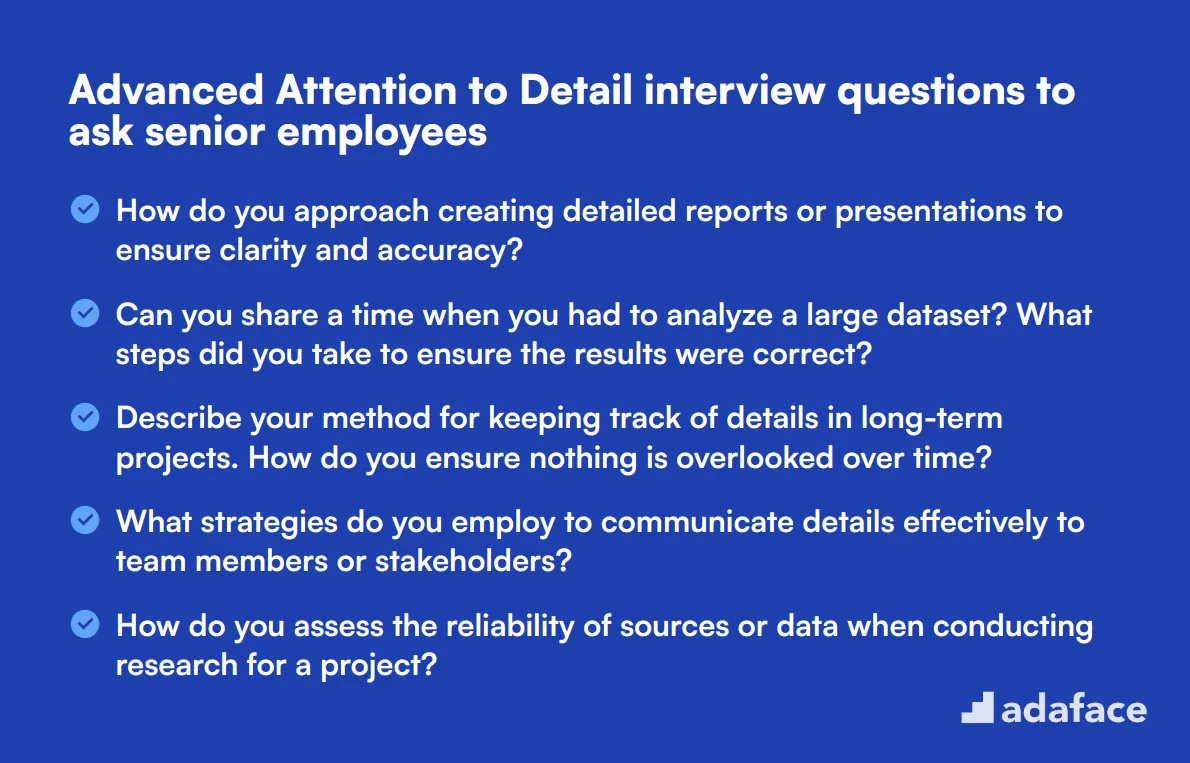
When interviewing senior candidates, asking advanced attention to detail questions can reveal their ability to manage complex tasks effectively. Use these questions to gauge how well they can maintain quality and precision, which is crucial for roles like an analyst where critical thinking and meticulousness are essential.
- How do you approach creating detailed reports or presentations to ensure clarity and accuracy?
- Can you share a time when you had to analyze a large dataset? What steps did you take to ensure the results were correct?
- Describe your method for keeping track of details in long-term projects. How do you ensure nothing is overlooked over time?
- What strategies do you employ to communicate details effectively to team members or stakeholders?
- How do you assess the reliability of sources or data when conducting research for a project?
- Can you explain a time when you had to follow strict compliance guidelines? How did you ensure you met all requirements?
- What role does technology play in helping you maintain attention to detail in your work?
- How do you adapt your attention to detail when collaborating with teams from different departments?
- Can you describe a situation where a lack of attention to detail led to a significant issue, and how you resolved it?
- How do you maintain a detail-oriented mindset when facing tight deadlines or high-pressure situations?
5 Attention to Detail interview questions and answers related to accuracy
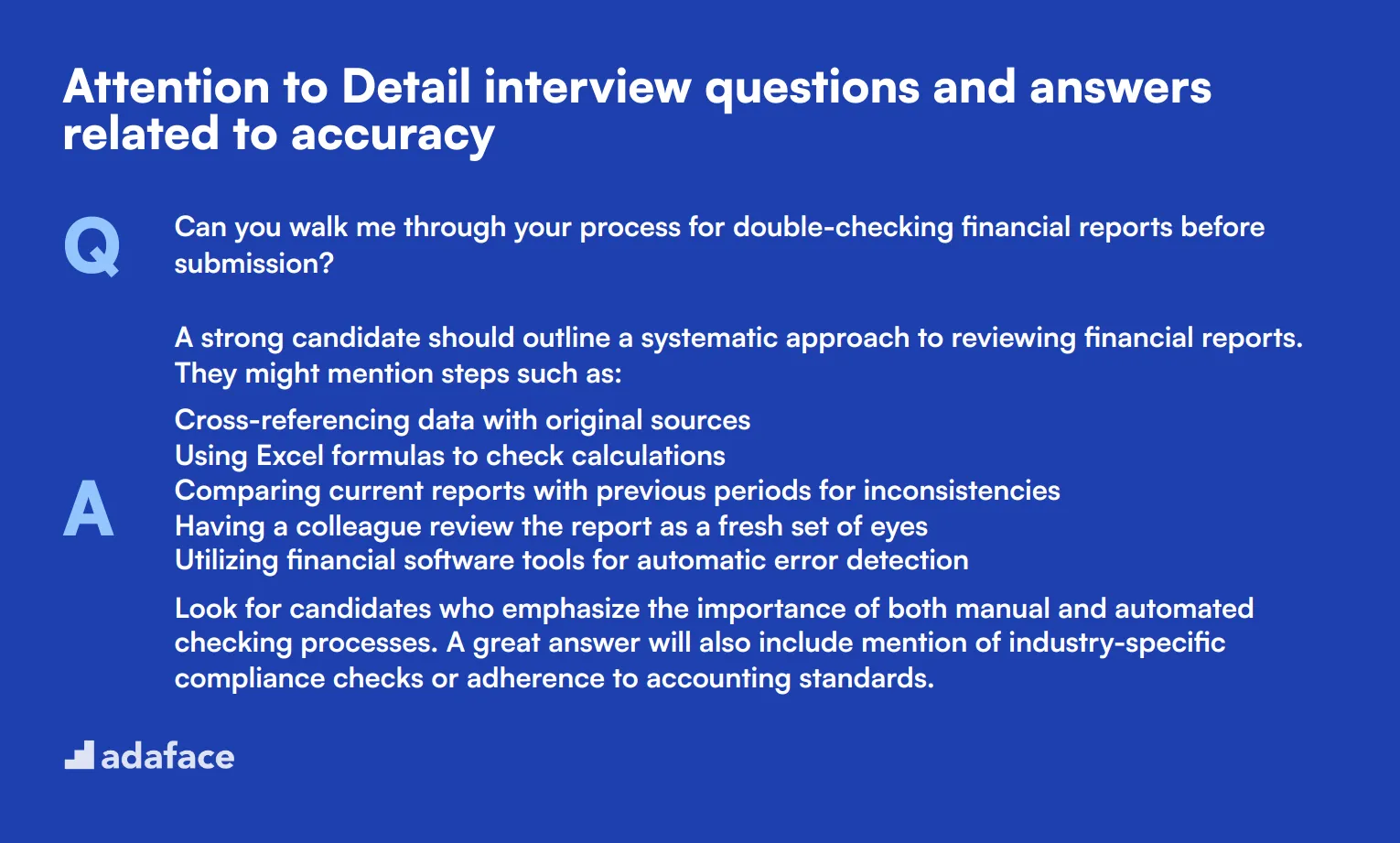
When it comes to assessing a candidate's accuracy, these attention to detail interview questions are your secret weapon. They'll help you uncover how meticulous and precise your potential hires are in their work. Use these questions to evaluate candidates for roles where precision is paramount.
1. Can you walk me through your process for double-checking financial reports before submission?
A strong candidate should outline a systematic approach to reviewing financial reports. They might mention steps such as:
- Cross-referencing data with original sources
- Using Excel formulas to check calculations
- Comparing current reports with previous periods for inconsistencies
- Having a colleague review the report as a fresh set of eyes
- Utilizing financial software tools for automatic error detection
Look for candidates who emphasize the importance of both manual and automated checking processes. A great answer will also include mention of industry-specific compliance checks or adherence to accounting standards.
2. How do you ensure accuracy when transcribing audio interviews or meetings?
An ideal response should cover both the transcription process and quality control measures. A candidate might describe:
- Using high-quality audio equipment and software
- Listening to small segments multiple times
- Employing shorthand techniques for efficiency
- Utilizing transcription software for initial drafts
- Conducting a final listen-through while reading the transcript
Pay attention to candidates who mention the importance of context and industry-specific terminology. The best answers will also touch on how they handle unclear audio or multiple speakers talking simultaneously.
3. Describe a time when you spotted a small detail that prevented a major issue in a project.
This question allows candidates to showcase their attention to detail in action. A strong answer might include:
- A specific example from their work history
- The process they used to identify the small detail
- The potential consequences if the detail had been missed
- Actions taken to address the issue
- Measures implemented to prevent similar oversights in the future
Look for responses that demonstrate the candidate's ability to connect small details to bigger picture outcomes. The best answers will show proactive problem-solving and a commitment to continuous improvement in accuracy.
4. How would you approach proofreading a 50-page technical document in a short timeframe?
An effective answer should balance thoroughness with efficiency. A candidate might propose:
- Skimming the document first to understand its structure and content
- Using digital tools like spell-checkers and grammar-checkers
- Focusing on one type of error at a time (e.g., spelling, then grammar, then formatting)
- Utilizing the document's table of contents or index for navigation
- Taking short breaks to maintain focus and fresh eyes
The best responses will also mention strategies for technical accuracy, such as cross-referencing with reliable sources or consulting subject matter experts. Look for candidates who emphasize the importance of critical thinking in addition to surface-level proofreading.
5. If you noticed a small discrepancy in a colleague's work, how would you address it?
This question assesses both attention to detail and interpersonal skills. A good answer might include:
- Double-checking their own observation to ensure it's correct
- Approaching the colleague privately and respectfully
- Asking questions to understand the context of the discrepancy
- Offering to help resolve the issue
- Suggesting a process improvement to prevent future occurrences
Look for candidates who demonstrate tact and diplomacy while still prioritizing accuracy. The best answers will show a balance between maintaining good relationships and ensuring high-quality work.
6 Attention to Detail interview questions and answers related to efficiency
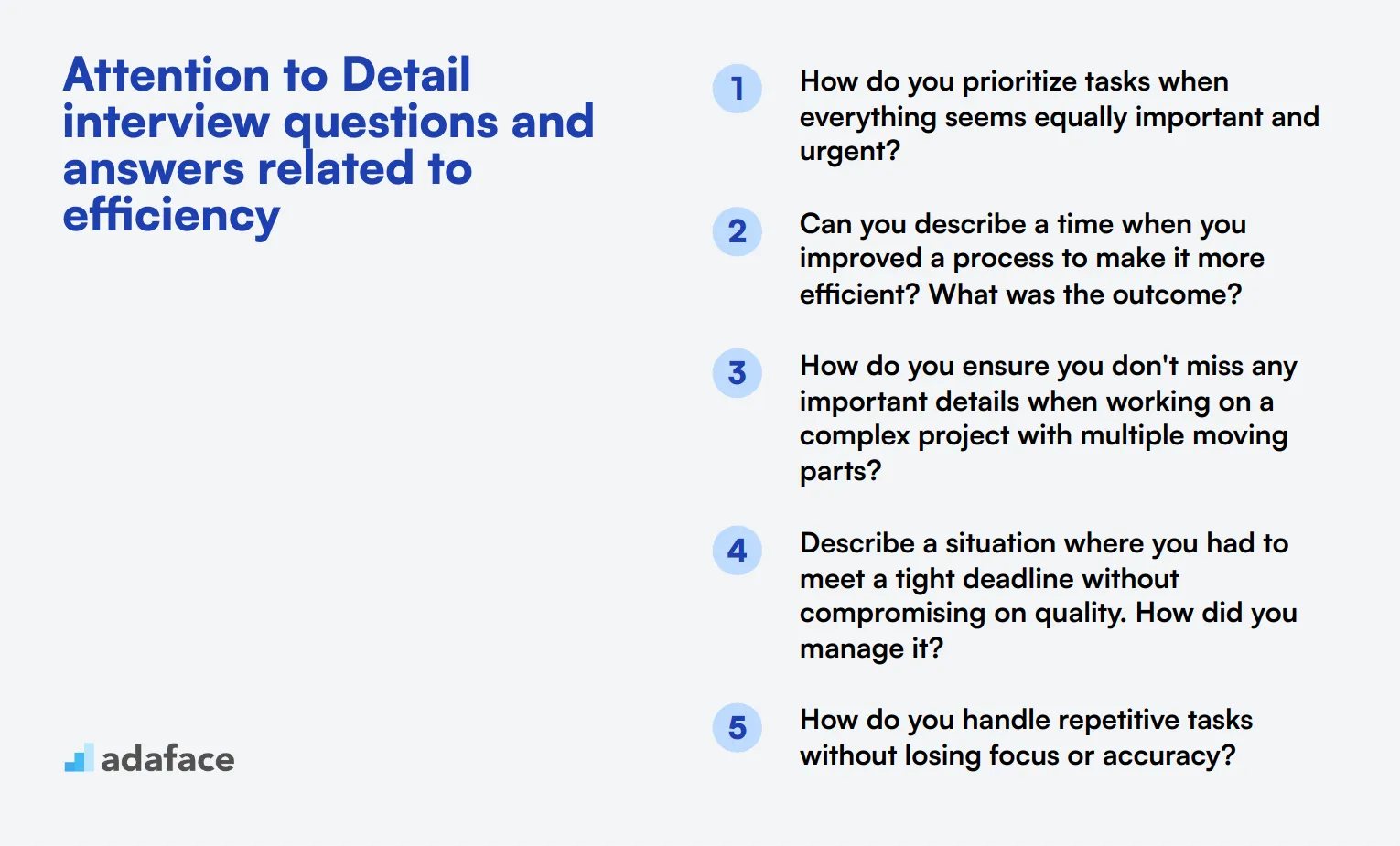
When it comes to assessing a candidate's efficiency and attention to detail, the right questions can reveal volumes. These carefully crafted queries will help you uncover how well applicants manage their time, organize their work, and maintain accuracy under pressure. Use this list to gauge efficiency and precision in your next round of interviews.
1. How do you prioritize tasks when everything seems equally important and urgent?
An effective answer should demonstrate the candidate's ability to assess and categorize tasks based on their impact and deadlines. Look for responses that mention:
- Using prioritization techniques like the Eisenhower Matrix (urgent/important grid)
- Considering the broader impact of each task on team or company goals
- Communicating with stakeholders to clarify true urgency and importance
- Breaking larger tasks into smaller, manageable chunks
- Regularly reassessing priorities as new information comes in
Pay attention to candidates who emphasize the importance of flexibility and communication in their prioritization process. Strong answers will show a balance between meeting deadlines and delivering quality work.
2. Can you describe a time when you improved a process to make it more efficient? What was the outcome?
A strong answer should outline a specific situation where the candidate identified an inefficiency, developed a solution, and implemented it successfully. Look for responses that include:
- Clear identification of the inefficient process
- Analysis of the problem and potential solutions
- Steps taken to implement the improvement
- Measurable results (e.g., time saved, increased output, reduced errors)
- Any challenges faced and how they were overcome
The ideal response will demonstrate the candidate's initiative, problem-solving skills, and ability to quantify results. Listen for mentions of collaboration with team members or stakeholders, as this shows good communication and teamwork in process improvement.
3. How do you ensure you don't miss any important details when working on a complex project with multiple moving parts?
An ideal answer should showcase the candidate's organizational skills and attention to detail. Look for mentions of:
- Creating detailed project plans or checklists
- Using project management tools or software
- Breaking down complex tasks into smaller, manageable steps
- Regular review and double-checking of work
- Effective communication with team members and stakeholders
- Setting up reminders or alerts for important deadlines or milestones
A strong candidate will emphasize the importance of both systematic approaches and adaptability. They might also mention how they balance attention to detail with overall project progress, ensuring that perfectionism doesn't hinder efficiency.
4. Describe a situation where you had to meet a tight deadline without compromising on quality. How did you manage it?
A good response should illustrate the candidate's ability to work under pressure while maintaining high standards. Look for answers that include:
- Clear explanation of the situation and the deadline constraints
- Strategies used to manage time effectively (e.g., prioritization, delegation)
- Methods for maintaining quality (e.g., regular check-ins, quality control processes)
- Any trade-offs made and how they were decided
- The final outcome and any lessons learned
Pay attention to candidates who mention seeking help when needed, communicating proactively with stakeholders about potential issues, and finding creative solutions to meet both time and quality requirements. The best answers will show a balance between efficiency and excellence.
5. How do you handle repetitive tasks without losing focus or accuracy?
An effective answer should demonstrate the candidate's ability to maintain concentration and precision in monotonous work. Look for strategies such as:
- Breaking the task into smaller, manageable segments
- Using timers or the Pomodoro Technique for focused work periods
- Creating checklists or templates to ensure consistency
- Implementing self-check mechanisms or quality control steps
- Finding ways to automate parts of the process where possible
- Varying the order of subtasks to maintain engagement
Strong candidates might also mention the importance of taking regular breaks to maintain mental freshness, or how they find meaning in repetitive tasks by understanding their importance to the larger project or organization. Listen for answers that show both practical techniques and a positive mindset towards routine work.
6. Can you explain your approach to organizing and managing multiple streams of information efficiently?
A comprehensive answer should showcase the candidate's ability to handle and process diverse information effectively. Look for mentions of:
- Using digital tools like project management software, note-taking apps, or personal knowledge management systems
- Implementing a consistent filing system or tagging methodology
- Regular review and consolidation of information
- Prioritizing information based on relevance and urgency
- Creating summaries or dashboards for quick reference
- Utilizing visual aids like mind maps or Kanban boards
The ideal response will demonstrate adaptability in organizing different types of information and an understanding of the importance of retrievability. Pay attention to candidates who mention strategies for keeping information up-to-date and how they share or collaborate on information with team members when necessary.
8 situational Attention to Detail interview questions with answers for hiring top employees
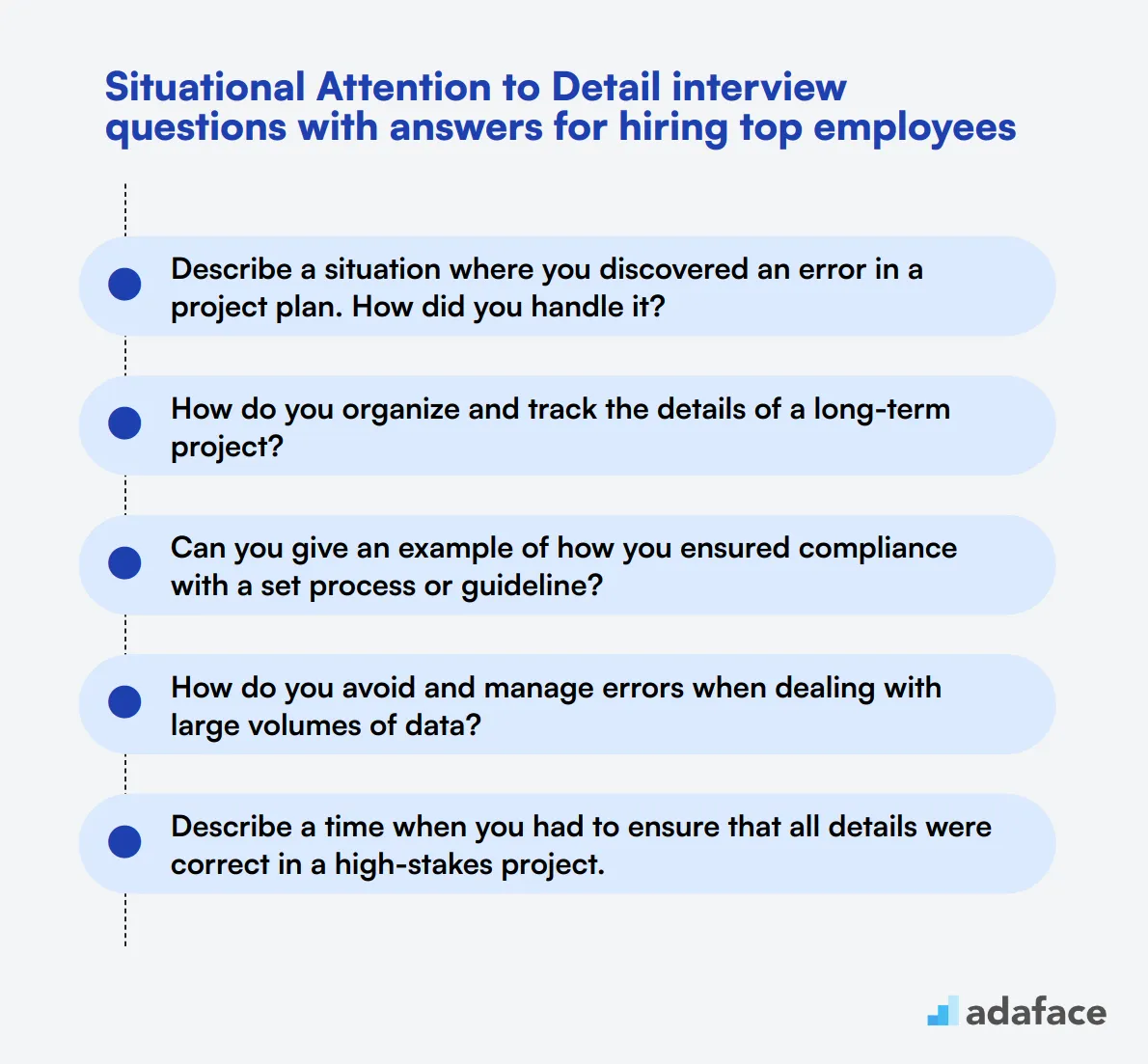
Ready to uncover the hidden gems in your candidate pool? Use these situational Attention to Detail interview questions to identify top-notch employees who excel in precision and accuracy. Perfect for when you need to separate the meticulous from the mediocre.
1. Describe a situation where you discovered an error in a project plan. How did you handle it?
In this scenario, a strong candidate would explain how they identified the error, analyzed its potential impact, and took proactive measures to correct it. They might detail their steps in communicating the issue to relevant stakeholders and ensuring that corrective actions were implemented.
Look for candidates who emphasize their problem-solving skills and their ability to maintain clear communication under pressure. An ideal response would highlight their methodical approach and commitment to quality, despite the challenges.
2. How do you organize and track the details of a long-term project?
Candidates will likely mention using various project management tools and techniques such as Gantt charts, task lists, or Kanban boards. They should discuss their strategies for setting milestones, tracking progress, and ensuring that all team members are aligned with the project's objectives.
A detailed response will show their ability to manage time effectively and prioritize tasks. Look for mentions of specific tools and methods they've successfully used in the past, as well as their approach to maintaining accurate records and documentation throughout the project.
3. Can you give an example of how you ensured compliance with a set process or guideline?
A detailed answer might include a specific instance where the candidate followed a particular set of guidelines or regulations meticulously. They should explain the importance of these guidelines for the project, how they ensured every team member was aware of and followed them, and the outcome of their diligence.
An ideal candidate will demonstrate their ability to understand and implement strict guidelines, showing a balance between adherence to rules and overall productivity. Look for evidence of their thoroughness and ability to enforce compliance without stifling creativity or efficiency.
4. How do you avoid and manage errors when dealing with large volumes of data?
Candidates might describe their process for double-checking entries, using automated tools, and conducting regular audits to ensure data accuracy. They should also explain how they handle discrepancies or errors when they do arise, including their methods for identifying the root cause and preventing future occurrences.
Look for responses that highlight a structured approach and familiarity with data management tools. An ideal answer would show a clear understanding of the importance of data integrity and the steps they take to maintain it, which you can find more about in skills required for data analysts.
5. Describe a time when you had to ensure that all details were correct in a high-stakes project.
In their answer, candidates should provide a specific example of a high-stakes project and detail their process for verifying every detail. They might describe how they created checklists, involved team members in cross-checking work, and used tools to track progress and ensure nothing was overlooked.
Look for clarity in their process and evidence of how their attention to detail directly contributed to the project's success. An ideal response would include measurable outcomes, such as meeting tight deadlines or achieving high client satisfaction.
6. How do you approach quality assurance in your work?
A solid answer will include specific techniques and tools the candidate uses for quality assurance, such as peer reviews, testing phases, and iterative improvements. They should explain how they integrate quality checks into their workflow and how they handle any identified issues.
Look for candidates who can articulate a clear QA process and demonstrate a proactive attitude towards maintaining high standards. Their response should reflect a commitment to continuous improvement and the ability to implement feedback effectively.
7. How do you handle situations where you have to work with incomplete or ambiguous information?
Candidates should describe their approach to seeking clarification, conducting additional research, or using logical reasoning to fill in gaps. They might also discuss how they communicate uncertainties to stakeholders and ensure that their assumptions are validated before proceeding.
An ideal response will show adaptability and problem-solving skills. Look for evidence of their ability to navigate ambiguity while maintaining accuracy and minimizing risks.
8. Describe a time when you had to adhere to strict compliance guidelines. How did you ensure you met all requirements?
A thorough answer would include an example where the candidate navigated complex compliance requirements. They should discuss their process for understanding the guidelines, implementing necessary steps, and verifying compliance throughout the project.
Look for candidates who emphasize their meticulous attention to detail and their ability to manage compliance without compromising on other aspects of the project. An ideal response will highlight their organizational skills and commitment to adhering to standards.
Which Attention to Detail skills should you evaluate during the interview phase?
While it's impossible to gauge every aspect of a candidate's capabilities in one interview, focusing on key skills related to attention to detail can offer valuable insights. Identifying these core skills helps in assessing how meticulous and thorough a candidate might be in their professional tasks.
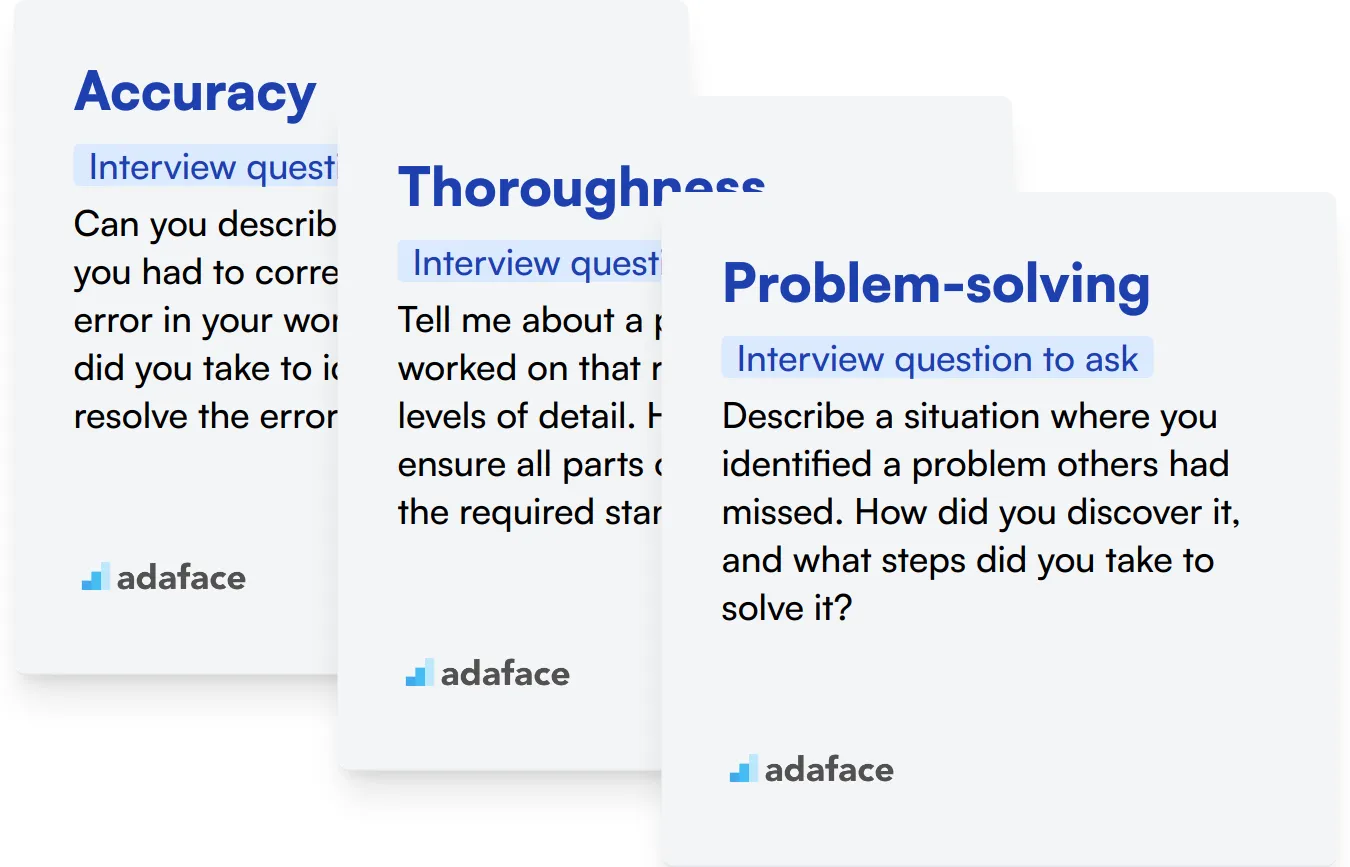
Accuracy
Accuracy is integral to attention to detail; it involves the ability to perform tasks with precision and minimal errors. This skill is critical as it impacts the quality of work and the efficacy of outcomes in any role requiring data handling, preparation of reports, or execution of specific procedures.
Consider using a tailored assessment test that includes relevant multiple-choice questions (MCQs) to evaluate a candidate's accuracy. Attention to Detail Test could be an effective way to filter candidates who excel in precision.
You can also pose specific interview questions designed to assess accuracy. Here is one to include in your interview:
Can you describe a time when you had to correct a significant error in your work? What steps did you take to identify and resolve the error?
Listen for the candidate's ability to recognize their mistake and their approach to rectify it. Effective answers should include specific strategies they employed to ensure such errors are minimized in the future.
Thoroughness
Thoroughness refers to an individual's ability to be consistently detailed across all parts of a task, ensuring completeness. The importance of thoroughness lies in its direct relation to the integrity and reliability of final outputs, which is crucial in many sectors such as finance, healthcare, and engineering.
You might consider assessing this skill with an appropriate MCQ test. If available, the Attention to Detail Test at Adaface can help determine a candidate's level of thoroughness.
To further explore their thoroughness, ask this interview question:
Tell me about a project you worked on that required high levels of detail. How did you ensure all parts of the project met the required standards?
Assess the candidate's response for their ability to manage and execute complex tasks with multiple components, ensuring no element is overlooked.
Problem-solving
Problem-solving is closely linked to attention to detail as it often requires identifying small but significant details that contribute to larger issues. This skill is indispensable in roles that demand quick and effective solutions to daily challenges.
To evaluate problem-solving skills related to attention to detail, consider using a specialized assessment. While a direct test for this specific combination isn't listed, exploring related assessments might yield benefits.
In the interview, pose this question to assess their problem-solving capabilities:
Describe a situation where you identified a problem others had missed. How did you discover it, and what steps did you take to solve it?
Look for detailed explanations of how they approached the problem, emphasizing the detection and resolution steps.
Strategies for Implementing Attention to Detail Interview Questions Effectively
Before you start putting what you have learned into action, here are a few strategic tips to effectively utilize Attention to Detail interview questions in your recruitment process.
1. Incorporate Skills Tests at the Initial Stages
Initiating the screening process with skills tests can significantly streamline the candidate selection. These tests help filter out candidates who lack the necessary abilities early, saving time and resources during later interview stages.
For assessing attention to detail, consider incorporating tests such as the Attention to Detail Test or the Data Entry Clerk Test for roles where precision is key. These assessments provide a practical measure of a candidate's meticulousness and accuracy.
Using these tests before face-to-face interviews ensures that only the most capable candidates advance, enhancing the effectiveness of subsequent interviews. This strategic positioning allows recruiters to delve deeper into the candidate's competencies during the personal interview stage.
2. Select and Tailor Your Interview Questions Carefully
With limited time available during an interview, choosing the right questions is crucial to evaluate candidates effectively. Focus on questions that are directly relevant to the key competencies of the job.
Explore additional skills that complement attention to detail by integrating questions from areas like problem-solving or logical reasoning, which are paramount for in-depth analysis and decision-making in many roles.
This approach ensures you cover all necessary aspects of the candidate’s abilities, giving you a comprehensive view of their potential to perform in the role.
3. Always Follow Up with Probing Questions
Merely asking standard interview questions might not reveal the full scope of a candidate’s abilities or their suitability for the role. It’s necessary to probe deeper with follow-up questions to uncover their true competency and potential fit.
For instance, if a candidate describes a situation where they demonstrated attention to detail, a good follow-up might be, 'Can you explain how you handled a mistake you discovered in your work?' This question helps assess their honesty and ability to learn from errors, crucial traits for meticulous work.
Streamline Your Hiring Process with Attention to Detail Tests and Interviews
When hiring for roles that require strong attention to detail, it's important to assess candidates' skills accurately. The most effective way to do this is by using attention to detail tests. These tests provide objective data on a candidate's ability to spot errors, focus on details, and maintain accuracy.
After using these tests to shortlist top applicants, you can conduct targeted interviews to further evaluate their skills. Ready to improve your hiring process? Sign up to access our attention to detail tests and other assessment tools designed to help you find the best talent for your team.
Attention To Detail Test
Download Attention to Detail interview questions template in multiple formats
Attention to Detail Interview Questions FAQs
Attention to detail is a key skill that impacts job performance across various roles. It helps ensure accuracy, quality work, and reduces errors, making it a valuable trait for employers to assess during interviews.
Use a combination of behavioral questions, problem-solving scenarios, and practical tasks. This approach allows you to assess how candidates apply their attention to detail skills in real-world situations.
Yes, this post provides questions for junior, mid-tier, and senior candidates, allowing you to tailor your interview process based on the experience level required for the position.
While some people naturally have strong attention to detail, it can be improved through practice, developing good habits, and using tools and techniques to enhance focus and accuracy.
These questions should be part of a well-rounded interview that also assesses other skills and qualifications. They can be integrated throughout the interview or used in a dedicated section focusing on this specific skill.

40 min skill tests.
No trick questions.
Accurate shortlisting.
We make it easy for you to find the best candidates in your pipeline with a 40 min skills test.
Try for freeRelated posts
Free resources




